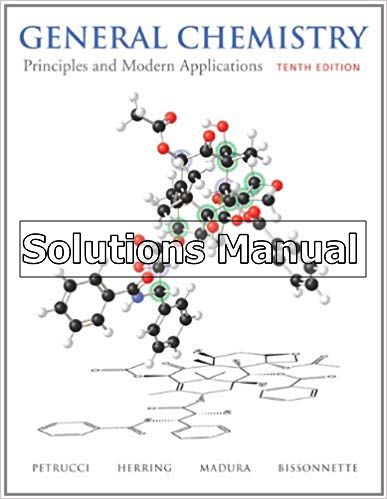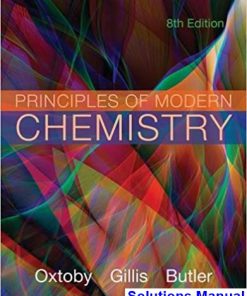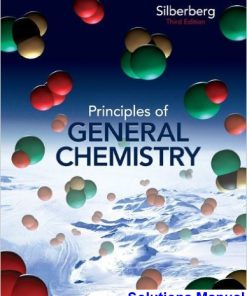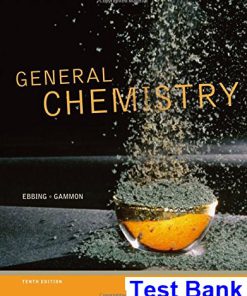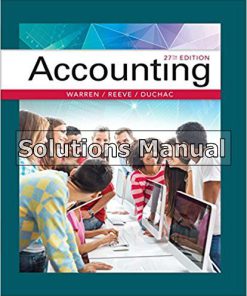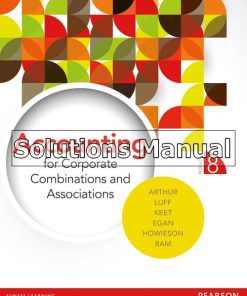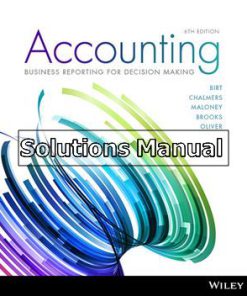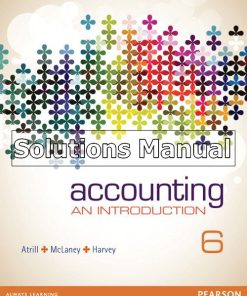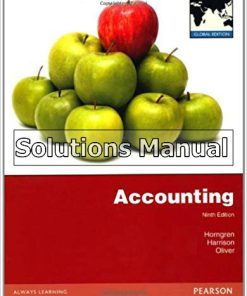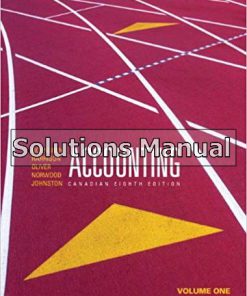General Chemistry Principles and Modern Applications 10th Edition Petrucci Solutions Manual
$26.50$50.00 (-47%)
General Chemistry Principles and Modern Applications 10th Edition Petrucci Solutions Manual.
You may also like
-
$26.50
$50.00
General Chemistry Principles and Modern Applications 10th Edition Petrucci Solutions Manual
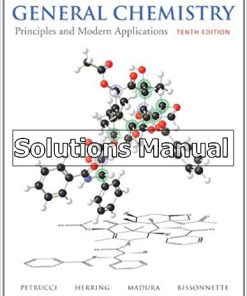
Product details:
- ISBN-10 : 0132064529
- ISBN-13 : 978-0132064521
- Author: Petrucci
General Chemistry: Principles and Modern Applications, is the most trusted book on the market recognized for its superior problems, lucid writing, and precision of argument and precise and detailed and treatment of the subject. The 11th edition offers enhanced hallmark features, new innovations and revised discussions that that respond to key market needs for detailed and modern treatment of organic chemistry, embracing the power of visual learning and conquering the challenges of effective problem solving and assessment.
Table contents:
1 Matter: Its Properties and Measurement
1(33)
1-1 The Scientific Method
2(2)
1-2 Properties of Matter
4(1)
1-3 Classification of Matter
5(3)
1-4 Measurement of Matter: SI (Metric) Units
8(5)
1-5 Density and Percent Composition: Their Use in Problem Solving
13(5)
1-6 Uncertainties in Scientific Measurements
18(1)
1-7 Significant Figures
19(15)
Summary
23(1)
Integrative Example
24(2)
Exercises
26(3)
Integrative and Advanced Exercises
29(2)
Feature Problems
31(1)
Self-Assessment Exercises
32(2)
2 Atoms and the Atomic Theory
34(34)
2-1 Early Chemical Discoveries and the Atomic Theory
35(3)
2-2 Electrons and Other Discoveries in Atomic Physics
38(4)
2-3 The Nuclear Atom
42(2)
2-4 Chemical Elements
44(4)
2-5 Atomic Mass
48(3)
2-6 Introduction to the Periodic Table
51(3)
2-7 The Concept of the Mole and the Avogadro Constant
54(2)
2-8 Using the Mole Concept in Calculations
56(12)
Summary
59(1)
Integrative Example
59(1)
Exercises
60(4)
Integrative and Advanced Exercises
64(1)
Feature Problems
65(1)
Self-Assessment Exercises
66(2)
3 Chemical Compounds
68(43)
3-1 Types of Chemical Compounds and Their Formulas
69(4)
3-2 The Mole Concept and Chemical Copmpunds
73(3)
3-3 Composition of Chemical Compounds
76(8)
3-4 Oxidation States: A Useful Tool in Decribing Chemical Compounds
84(2)
3-5 Naming Compounds: Organic and Inorganic Compunds
86(1)
3-6 Names and Formulas of Inorganic Compounds
87(7)
3-7 Names and Formulas of Organic Compunds
94(17)
Summary
100(1)
Integrative Example
101(2)
Exercises
103(4)
Integrative and Advanced Exercises
107(1)
Feature Problems
108(2)
Self-Asessment Exercises
110(1)
4 Chemical Reactions
111(40)
4-1 Chemical Reactions and Chemical Equations
112(4)
4-2 Chemical Equations and Stoichiometry
116(7)
4-3 Chemical Reactions in Solution
123(6)
4-4 Determining the Limiting Reactant
129(3)
4-5 Other Practical Matters in Reaction Stoichiometry
132(19)
Summary
138(1)
Integrative Example
139(1)
Exercises
140(8)
Feature Problems
148(1)
Self-Assessment Exercises
149(2)
5 Introduction the Reactions in Aqueous Solutions
151(41)
5-1 The Nature of Aqueous Solutions
152(4)
5-2 Precipitation Reactions
156(4)
5-3 Acid-Base Reactions
160(5)
5-4 Oxidation-Reduction Reactions: Some General Principles
165(5)
5-5 Balancing Oxidation-Reduction Equations
170(5)
5-6 Oxidizing and Reducing Agents
175(2)
5-7 Stoichiometry of Reactions in Aqueous Solutions: Titrations
177(15)
Summary
181(1)
Integrative Example
182(1)
Exercises
183(4)
Integrative and Advanced Exercises
187(2)
Feature Problems
189(2)
Self-Asessment Exercises
191(1)
6 Gases
192(49)
6-1 Properties of Gases: Gas Pressure
193(5)
6-2 The Simple Gas Laws
198(6)
6-3 Combining the Gas Laws: The Ideal Gas Equation and the General Gas Equation
204(3)
6-4 Applications of the Ideal Gas Equation
207(3)
6-5 Gases in Chemical Reactions
210(2)
6-6 Mixtures of Gases
212(4)
6-7 Kinetic-Molecular Theory of Gases
216(7)
6-8 Gas Properties Relating to the Kinetic-Molecular Theory
223(3)
6-9 Nonideal (Real) Gases
226(15)
Summary
229(1)
Integrative Example
230(1)
Exercise
231(5)
Integrative and Advanced Exercises
236(2)
Feature Problems
238(2)
Self-Assessment Exercises
240(1)
7 Thermochemistry
241(53)
7-1 Getting Started: Some Terminology
242(2)
7-2 Heat
244(4)
7-3 Heats of Reaction and Calorimetry
248(4)
7-4 Work
252(3)
7-5 The First Law of Thermodynamic
255(4)
7-6 Heats of Reaction: &U and &H
259(7)
7-7 Indirect Determination of &H: Hess’s Law
266(2)
7-8 Standard Enthalpies of Formation
268(7)
7-9 Fuels as Sources of Energy
275(19)
Summary
281(1)
Integrative Example
282(1)
Exercises
283(6)
Integrative and Advanced Exercises
289(2)
Feature Problems
291(1)
Self-Assessment Exercises
292(2)
8 Electrons in Atoms
294(66)
8-1 Electromagnetic Radiation
295(5)
8-2 Atomic Spectra
300(2)
8-3 Quantum Theory
302(5)
8-4 The Bohr Atom
307(6)
8-5 Two Ideas Leading to a New Quantum Mechanics
313(2)
8-6 Wave Mechanics
317(7)
8-7 Quantum Numbers and Electron Orbitals
324(3)
8-8 Interpreting and Representing the Orbitals of the Hydrogen Atom
327(6)
8-9 Electron Spin: A Fourth Quantum Number
333(3)
8-10 Multielectron Atoms
336(3)
8-11 Electron Configurations
339(5)
8-12 Electron Configurations and the Periodic Table
344(16)
Summary
348(1)
Integrative Example
349(2)
Exercises
351(6)
Integrative and Advanced Exercises
357(1)
Feature Problems
358(1)
Self-Assessment Exercises
359(1)
9 The Periodic Table and Some Atomic Properties
360(35)
9-1 Classifying the Elements: The Periodic Law and the Periodic Table
361(3)
9-2 Metals and Nonmetals and Their lons
364(3)
9-3 Sizes of Atoms and Ions
367(7)
9-4 Ionization Energy
374(4)
9-5 Electron Affinity
378(1)
9-6 Magnetic Properties
379(2)
9-7 Periodic Properties of the Elements
381(14)
Summary
386(1)
Integrative Example
386(3)
Exercises
389(2)
Integrative and Advanced Exercises
391(1)
Feature Problems
392(1)
Self-Assessment Exercises
393(2)
10 Chemical Bonding I: Basic Concepts
395(54)
10-1 Lewis Theory: An Overview
396(3)
10-2 Covalent Bonding: An Introduction
399(3)
10-3 Polar Covalent Bonds and Electrostatic Potential Maps
402(6)
10-4 Writing Lewis Structures
408(8)
10-5 Resonance
416(2)
10-6 Exceptions to the Octet Rule
418(3)
10-7 Shapes of Molecules
421(12)
10-8 Bond Order and Bond Lengths
433(1)
10-9 Bond Energies
434(15)
Summary
438(1)
Integrative Example
439(1)
Exercises
440(6)
Integrative and Advanced Exercises
446(1)
Feature Problems
447(1)
Self-Assessment Exercises
448(1)
11 Chemical Bonding II: Additional Aspects
449(49)
11-1 What a Bonding Theory Should Do
450(1)
11-2 Introduction to the Valence-Bond Method
451(2)
11-3 Hybridization of Atomic Orbitals
453(8)
11-4 Multiple Covalent Bonds
461(4)
11-5 Molecular Orbital Theory
465(9)
11-6 Delocalized Electrons: Bonding in the Benzene Molecule
474(6)
11-7 Bonding in Metals
480(4)
11-8 Some Unresolved Issues: Can Electron Charge-Density Plots Help?
484(14)
Summary
489(1)
Integrative Example
489(2)
Exercises
491(3)
Integrative and Advanced Exercises
494(1)
Feature Problems
495(2)
Self-Assessment Exercises
497(1)
12 Intermolecular Forces: Liquids and Solids
498(59)
12-1 Intermolecular Forces
499(9)
12-2 Some Properties of Liquids
508(12)
12-3 Some Properties of Solids
520(2)
12-4 Phase Diagrams
522(4)
12-5 Network Covalent Solids and Ionic Solids
526(4)
12-6 Crystal Structures
530(12)
12-7 Energy Changes in the Formation of Ionic Crystals
542(15)
Summary
545(1)
Integrative Example
546(1)
Exercises
547(5)
Integrative and Advanced Exercises
552(2)
Feature Problems
554(2)
Self-Assessment Exercises
556(1)
13 Solutions and Their Physical Properties
557(45)
13-1 Types of Solutions: Some Terminology
558(1)
13-2 Solution Concentration
558(4)
13-3 Intermolecular Forces and the Solution Process
562(5)
13-4 Solution Formation and Equilibrium
567(3)
13-5 Solubilities of Gases
570(3)
13-6 Vapor Pressures of Solutions
573(4)
13-7 Osmotic Pressure
577(4)
People also search:
General Chemistry Principles and Modern Applications 10th
General Chemistry Principles and Modern Applications 10th edition
General Chemistry Principles and Modern Applications 10th pdf
General Chemistry Principles and Modern Applications 10th pdf free
General Chemistry Principles and Modern Applications 10th download scribd
General Chemistry Principles and Modern Applications 10th pdf download free
General Chemistry Principles and Modern Applications 10th Edition Petrucci Test Bank

